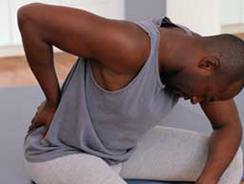- Glycerol-3-phosphate dehydrogenase
- Malic enzyme
- Fatty acyl CoA oxidase
Tag Archives: weight
Gym bags causing injury to millions, according to new research
New research shows nearly 2 million (36%)* UK gym goers need to lighten the load after suffering from back and neck pains at least once a week as a result of carrying heavy work and gym bags. The Saucony Kinvara 3** poll shows the array of unnecessary items fitness fans lug around on a daily basis is negating the benefits of their exercise routines by putting their postures at risk of long term damage.
A quarter carry around batteries (27%), fruit (53%), hair straighteners (17%) and even children’s toys (11%) in their gym bags. While over half refuse to leave home without a spare pair of pants (54%) or emergency toilet roll (16%).
Vanity and hygiene were also to blame for weighing down bags, with 5 million UK gym goers (97%) carrying 5-10 products just for grooming and beauty. One in ten of those surveyed admitted to leaving clothing in their gym bags for 1-2 months. Meanwhile twice the amount of men (15%) compared to women (8%) confessed to leaving unwashed clothing festering for a fortnight.
“We need to get the Nation back to basics when it comes to running. Forget expensive gym memberships or lugging around heavy bags – lightweight running gear and minimalist trainers are all you need. The Saucony Kinvara 3 is an award-winning training shoe that is so lightweight, just 220g***, you can get rid of all these random items and just run!” said Jonathan Quint, Marketing Manager for Saucony UK and Ireland.
 |
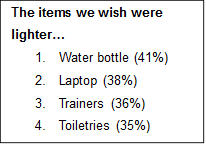 |
The UK regions needing to simplify their stride:
– Gym goers in the East Midlands experience neck and back pain most frequently, with 47% suffering at least once a week, compared to just 23% in the East of England
– The pampering products of Londoners are damaging postures the most with 10% of gym goers carrying between 15-25 grooming/beauty products with them
– The East Midlands are the most hair-conscious with 23% weighing bags down with hairdryers, compared to just 4% of those from the North East
Nick Anderson, Saucony Coaching Ambassador and founder of fitness coaching company Running With Us, gives his top tips for getting back to basics when running…
1. A good posture is your best ally to avoid neck and back pains. Always stand tall with a very slight forward lean, your chest out, shoulders back and imagine your head is being pulled up towards the sky by a cord
2. Tension in the shoulder or neck caused by heavy bags will put additional stress on the upper posture leading to headaches, muscular tightness and ultimately, poor performance. Avoid that trip to the osteopath by keeping your kit to a minimum
3. If you must carry a small bag, choose a running rucksack that binds in across the body and fits tightly against the middle of the back as you run. Have it strapped on evenly at all times and make sure it doesn’t move while you run
4. There are lots of great running clubs out there that take your bags for you, such as www.homerunlondon.com
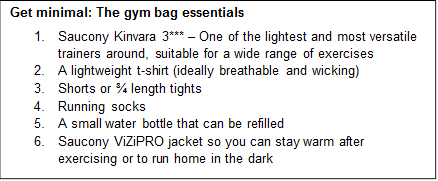
* Research conducted from 13-20th September 2012 by Research Now, with a sample size of 1,024 UK adults who are regular gym goers
UK ‘Gym Goers’ based on UK Mintel research (2010) that 5.2 million adults have membership of a private gym: http://www.mintel.com/press-centre/press-releases/458/boom-time-for-budget-exercise
** About Saucony, Inc.: Saucony, Inc., a subsidiary of Collective Brands, Inc., is a leading global running lifestyle brand that fuses performance, innovation and style to create compelling footwear and apparel with its widely recognized brands Saucony and Saucony Originals. Founded in 1898, Saucony continues to inspire runners everywhere with its award winning innovations, including ProGrid™, PowerGrid™ ViZiPRO™ and AMP PRO2™ apparel. At Saucony, a good day is when we get to run. A great day is when we inspire someone else to run.
*** About the Kinvara 3:
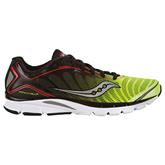
Winner of the “Best Natural Running Shoe” award from Running Fitness, “Best Update” award from Runner’s World, and the “Minimalist Shoe Gold Award” from Men’s Running, all in 2012.
Other key features of the Kinvara 3 include:
- Weight of only 220g (based on a men’s size 8, 190g for a ladies size 6) for a lighter and more flexible running experience
- FlexFilm technology to secure and stabilize the foot throughout the gait cycle
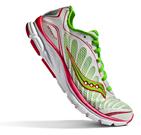
- Memory Foam heel pods in the collar to ensure an ultra-secure ride
- Available in men’s sizes 7-12, 13 and 14, and women’s sizes 4-9
- Available in white/citron/pink, blue/white and white/pink/blue for women and blue/citron and black/citron/red for men
- RRP: £95
Eat more to loose weight – new diet advice
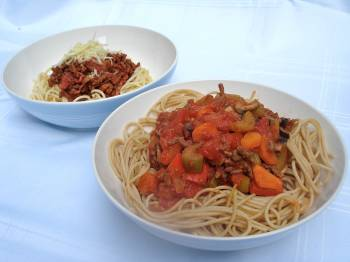

London: Eat more to loose weight, is the latest advice from experts at the British Nutrition Foundation(BNF).
IIn a new leaflet entitled Eat more, lose weight the BNF shows how slimmers can eat enough food to feel really full without consuming too many calories. The advice provided by the BNF is based on scientific evidence that lowering the energy density, or the amount of calories per gram of food consumed, can help people lose weight without feeling hungry1.
By manipulating the energy density of the diet, you can eat much more food for fewer calories, says Bridget Benelam, Senior Nutrition Scientist at the BNF.
“For example, a home-made burger, fried chips, ketchup and a standard soft drink can provide over 1000 calories and weighs about 650g. Whereas, you can eat nearly double the amount in weight (about 1200g) for about half the calories, with a low energy density meal of, for example, soup, a low-fat sandwich, a diet soft drink and a fruit and yogurt dessert.
What is energy density?
Energy density is the number of calories per gram of food (kcal/g). It is mainly affected by the water content, but also by the fat content of the foods.
Foods with a lower energy density include those with a high water content, such as soups and stews, foods like pasta and rice that absorb water during cooking, and foods that are naturally high in water, such as fruit and vegetables. At the other end of the scale, higher energy density foods tend to include those that are high in fat and have a low water content, for example biscuits and confectionery, fried snacks, nuts and full-fat hard cheese2.
The energy density of the diet overall is determined by the balance of higher and lower energy density foods consumed. Small amounts of food with a high energy density can be eaten as part of a low energy density diet, as long as some food with a medium energy density and plenty of food with a low energy density is consumed alongside. Also, by eating foods with a low energy density first, for example, having a salad without oily dressing or a broth-based soup, youll naturally feel fuller and less tempted by the high energy dense foods3, 4.
Menu makeovers
The Eat more, lose weight leaflet shows how simple changes to your daily meals can make a significant difference to the amount of food you can consume for the same number of calories. For example, choosing fruit and cereal, instead of pastries for breakfast, soup and salad instead of burger and chips for lunch, and making a wholemeal pasta dish with a low-fat cheese sauce and extra vegetables, instead of white pasta with a standard full-fat cheese sauce for dinner, means that instead of consuming 2285 calories in 1487g of food, you can have 2321g of food for 1495 calories.
And it doesnt mean completely changing your eating habits favourite recipes also get a makeover in the BNF leaflet. A 400g portion of spaghetti Bolognese with standard mince, bacon and full-fat cheese contains 760 calories. However, a few simple changes can cut its calorie content by well over half. Using lean mince instead of standard mince, choosing wholemeal spaghetti, adding plenty of vegetables and using a smaller portion of a reduced-fat cheese brings the calorie content of a 400g portion down to 330 calories.
Avoiding weight-loss pitfalls
The leaflet also addresses key behaviours that can make or break attempts at weight loss. Benelam continues Its important to remember that we live in an obesogenic* environment and that we need to consider other aspects of our lifestyle, as well as the foods we eat. Things like keeping active, avoiding distractions while eating and resisting the temptation to try every dish at a buffet can really help keep weight control on track.
*Factors tending to make people overweight
1Benelam (2009) Satiation, satiety and their effects on eating behaviour. Nutrition Bulletin 34(2) 126-173
2 BNFs feed yourself fuller chart provides examples of foods with a high medium and low energy density. Find here at
3 Flood JE & Rolls BJ (2007) Soup preloads in a variety of forms reduce meal energy intake. Appetite 49(3) 626-34
4 Rolls BJ, Roe LS & Meengs JS (2004) Salad and satiety: Energy density and portion size of a first-course salad affect energy intake at lunch. Journal of the American Dietetic Association 104 (10) 1570-1576
Low energy density recipe
Spaghetti Bolognese**
Serves 6
The picture below shows the low energy density recipe on the right, and a higher energy density version on the left. Although the low energy density version is nearly double the weight of the higher energy density dish, they contain the same amount of calories.
**Recipe provided by Slimming World
Ingredients
Low calorie cooking spray
1 onion, finely chopped
1 medium carrot, finely diced
2 celery sticks, finely diced
1 red pepper and 1 yellow pepper, deseeded and finely chopped
200g/7 oz button mushrooms,thinly sliced
2 garlic cloves, finely chopped
1 red chilli, deseeded and thinly sliced
1 tsp dried oregano
400g/1lb extra lean minced beef
A handful of fresh basil leaves
2 x 400g can chopped tomatoes
1 tsp artificial sweetener
Salt and freshly ground black pepper
380g/13½ oz dried wholewheat spaghetti
grated reduced-fat Cheddar cheese, to garnish (optional)
Method
1. Spray a large, non-stick pan with low calorie cooking spray and cook the vegetables, garlic,red chilli and oregano for 4-5 minutes. Add the minced beef and fry for a further 3-4 minutes.
2. Reserving a few leaves for garnish, finely chop the basil. Add to the pan along with the chopped tomatoes and sweetener. Season well, bring to the boil, reduce the heat and simmer for 12-15 minutes. Meanwhile, cook the spaghetti according to the packet instructions, drain and keep warm.
3. Remove the sauce from the heat, divide the spaghetti between four warmed plates, and spoon the sauce over. Garnish with the remaining basil and the grated cheese, if using, and serve immediately.
Calories per serving: 330 kcal Energy density: 0.75 kcal/g
Mixed berries, yogurt, granola, honey
Below is the mixed berries yoghurt and honey recipe, compared with a portion of strawberries and cream. Although the portion sizes are clearly different these two dishes contain the same number of calories.
Serves 1
Ingredients
100g low-fat yogurt
1 tablespoon granola
5 fresh strawberries (60g)
15 fresh raspberries (60g)
50g fresh blueberries
1 teaspoon honey
Method
1. Rinse the strawberries, raspberries and blueberries.
2. Place in a bowl or tall glass and cover with the low fat yogurt.
3. Sprinkle the granola on top and drizzle with honey.
Calories per serving: 215 kcal Energy density: 0.7 kcal/g
The leaflet Eat more, weigh less is published by the BNF and available on the BNF website at Leaflet This leaflet is based on research in the area of satiety and appetite control, published by the Foundation
BNF was established over 40 years ago and exists to deliver authoritative, evidence-based information on food and nutrition in the context of health and lifestyle. The Foundations work is conducted and communicated through a unique blend of nutrition science, education and media activities. BNFs strong governance is broad-based but weighted towards the academic community. BNF is a registered charity that attracts funding from a variety of sources, including contracts with the European Commission, national government departments and agencies; food producers and manufacturers, retailers and food service companies; grant providing bodies, trusts and other charities.
The Foundation thanks Slimming World for their advice and help on the content and design of this leaflet.
The British Nutrition Foundation is a registered charity. It promotes the wellbeing of society through the impartial interpretation and effective dissemination of scientifically based knowledge and advice on the relationship between diet, physical activity and health.
Avoid déjà vu dieting – watch this video
London: This coming year more and more of us are likely to make dieting our New Years resolution. However for many of us, this will be a ritual we are all too familiar with. Having tried dieting the year before and been unsuccessful, the process of losing weight and then gaining it is something us women struggle with on a regular basis.
Losing weight and keeping the weight off can give you a better quality of life, not only will you look fabulous in that dress, but the health benefits are astounding, reducing the risk of life threatening diseases such as type-2 diabetes and heart disease, two of the leading causes of death worldwide1.
With all the weight loss programmes and diets that Britons are attempting this New Year, its important to know what food and exercise combinations can help you lose weight consequently reducing visceral fat. Visceral fat which surrounds vital organs in the abdomen cant be seen or felt, but the metabolically active fat in unhealthy amounts can add to serious health problems.
Show date: Monday 4th January
Show time: 2:30pm
In this live WebTV show, David Haslam, chairman of the National Obesity Forum, and Terry Maguire, Pharmacist of Maguire Pharmacy, Belfast, explain what you can do to avoid the yo-yo dieting pattern and how to get rid of dangerous hidden fat. We also have Paula Keogh talking about her weight loss experiences with alli*. Submit your questions before hand or ask them live.
David Haslam, Terry Maguire and Paula Keogh join us live online at Live Web TV
on Monday 4th January at 2:30pm to discuss visceral fat and weight loss.
*alli is a weight loss aid for overweight adults with a BMI of 28 or over, designed to be used with a comprehensive support programme.
References:
1. World Health Organisation. Fact Sheet – The top ten causes of death. FACT SHEET
TV presenter Kirsty Gallacher reveals her hourglass figure secret


London: TV presenter Kirsty Gallacher reveals why the hour glass figure overtakes the perfect 10 in the body aspiration stakes.
Whether youre twenty or fifty the hour glass figure remains the body shape the majority of us aspire to. With over two thirds of the nation wishing they had the classic Marilyn curves, it would seem that the boyish body personified by Twiggy in the sixties and Kate Moss in the nineties and noughties is somewhat outdated.
In a landmark study, commissioned to celebrate the 50th anniversary of Kelloggs Special K, over 2,000 women across the UK were surveyed to examine the key influences that have impacted on the female body ideal and the things that have boosted and bruised our confidence over the last five decades.
The results showed that real women are resolutely rejecting perfection and demanding more honesty to inspire better shape confidence. Key body shape boosters include seeing shapely women on TV rather than size zero models, curvy celebrities with hunky boyfriends (such as Charlotte Church and Gavin Henson), and older actresses such as Helen Mirren baring all for nude scenes.
As well as applauding women in the public eye who are honest about their bodies, British women believe influencers like the media could and should do more to inspire real women. Well someone who knows a thing or two about the pressures of staying in shape is TV presenter and mum Kirsty Gallacher. After almost a decade in the spotlight, the recently engaged star talks frankly about her body and how she maintains her classic hour glass shape.
Click here to watch the video: Kirsty video
For more information about shape management visit www.specialk.co.uk
Diet pill Acomplia banned in EU

London: The controversial diet pill Acomplia has been banned by European safety chiefs, over concerns that it may be linked to suicide in vulnerable individuals.
The European Medicines Agency (EMA) has ordered doctors to stop prescribing Acomplia now following several deaths, including a suicide and reports of other adverse reactions. It is already banned in the US.
The UK’s, National Institute for Health and Clinical Excellence approved the drug four months ago. At that time there were warnings on the packet about the increased risk of depression, anxiety and other ‘serious’ side effects. The EMA also warned that Acomplia should not be taken by patients with major depression or on antidepressants.
Now the EMA has suspended the medicine’s licence because the ‘benefits no longer outweigh its risks’.
It said: “New data from post-marketing experience and ongoing clinical trials indicated that serious psychiatric disorders may be more common than in the clinical trials.”
Patients taking Acomplia are advised to see their doctor or pharmacist
Acomplia, also known as rimonabant, was licensed for the treatment of obesity and overweight patients with type 2 diabetes.
In medical trials. the drug demonstrated that it was helpful to two out five patients in loosing up to 10 per cent of their body body weight.
But a scientific review in The Lancet medical journal found a 40 per cent higher chance of being harmed by ‘adverse events or serious adverse events’.
The pill, made by the French firm Sanofi-Aventis, works by interfering with a system in the body which controls energy levels, reducing the cravings for food and helping to prevent fat from being deposited.
Acomplia costs £44 a month in the UK, and is marketed in 18 European countries.
Drinking water doesn’t help weightloss

Tokyo: Advice to drink lots of water to loose weight is a waste of time, according to new research.
Researchers at the University of Tokyo have found that drinking the elixir of life does not keep one trim — instead, one could be better off eating foods rich in water like fruit, vegetables, rice, soups and casseroles.
According to them, it is unclear why water in food but not in drinks affects weight — it could be due to water-rich foods such as fruit, vegetables and rice also high in fibre.
In fact, the researchers have based their findings on an analysis of 1,000 young women in Tokyo. They compared the weight and waist size of the participants with the amount of water they consumed each day, both from drinks and food.
The study, published in the latest edition of the Nutrition Journal, found no link between water in drinks, including water itself, tea, coffee, soft drinks and fruit juices, and body shape, the ‘Daily Mail’ reported.
But the researchers found a link between water taken in from food, with women who ate the highest quantities of water-rich foods tending to have slightly smaller waists. And, those subjects also had a lower body mass index, meaning they were a better weight for their height.
The link held firm even when other factors such as the amount of exercise done and whether the woman was dieting were taken into consideration.
Monica Reinagel – nutrionist and best-selling author

Monica Reinagel is author of The Inflammation Free Diet Plan. You can write to her at monica@inflammationfreediet.com
Protein rich diets prevent weight gain – new research

Madrid: A diet rich in proteins can help to avoid regaining weight after weight loss, according to new reseach.
Increasing the consumption of proteins in ones diet can help to avoid regaining weight after successfully losing weight through diet and exercise; on the other hand, the glycemic index does not play a significant role.
This was the preliminary conclusion of the Diogenes project (diet, obesity and genes, the largest European study into nutrition and obesity.
Adult participants from 400 families from eight countries (Denmark, the Netherlands, the United Kingdom, Bulgaria, Greece, Czech Republic, Germany and Spain), were tracked over the course of six months, during which they were required to lose at least 8% of their body weight.
At this stage the entire family was included in the weight-loss regimen. In total, 763 individuals lost an average of 11.2 kilograms per person, for a total of 8,500 kilograms, the equivalent of four adult elephants.
Five randomly-assigned diets
In the next phase of the experiment, 565 families (763 adults and 787 children) followed one of five randomly-assigned diets; four of these diets combined diverse proportions of protein and carbohydrate intakes, and the fifth was based on the previous eating habits of the family, with advice on healthy diet.
Those families which were assigned a high-protein diet did not recover the weight previously lost, whereas those assigned other diets recovered between 2 and 2.5 kg of the weight lost during the prior stage.
The definitive findings of the project will be known in May of 2009, when the projects researchers will participate in the European Congress on Obesity in Amsterdam.
New fitness campaign to tackle UK obesity epidemic
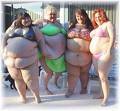
London: The UK government has thrown its weight behind a national activity campaign to encourage two million Britons to get fit for 2012 and raise billions for charity in the process.
The Great Activity Revolution has signed up Government, local authorities, charities, and a host of celebrities and sports stars to back the campaign, which over the next four years will develop a huge network of nationally available sporting events.
The campaign is designed to encourage mass participation in a range of easily accessible activities including running, swimming, cycling, walking, gym and dance – in the process raising huge amounts for charity. Most importantly, the campaign will tackle the health issues caused by inactivity.
Former Olympian Brendan Foster was in London to launch the Great Activity Revolution at an event attended by the Minister for the Olympics, Tessa Jowell, and Gerry Sutcliffe, Minister for Sport.
Brendan said: Inactivity is a ticking time bomb which puts the health of our entire nation under threat. The UK is less fit than it has ever been and when research shows our children have a shorter life expectancy than their parents, we simply have to do something.
The Great Activity Revolution is based on the key motivator for changing behaviour towards activity and participation is the challenge of an event. The campaign website provides individuals with all the tools they need to find an event to enter and all the preparation aids and advice to help them through their training.
Brendan added: By encouraging people to enter mass participation events they can have fun getting fit and also raise money for a number of our charity partners.
Tessa Jowell said: Lots of people want to get fitter but the hardest thing is often putting on your trainers and taking that first crucial step to turn a wish into a reality. That’s why Brendan’s imaginative campaign is so terrific, motivational and simple and will be so effective.
The Great Activity Revolution has gained the support of Manchester as its lead partner city. Bosses have pledged to back the initiative and encourage people to take to Take to the Streets over the next four years, hosting an exciting series of launch events.
The launch coincides with the introduction of the new Great Activity website www.greatactivity.org
This makes it easy for people to Join The Revolution. It contains everything people of all abilities will need to know about training and preparation for free and offers a brand new digital Training Room facility which features personalised interactive training plans, detailed advice, an extensive event search engine, a public forum and an individual blog.
Users can also gain free access to a unique software package called the Great Trainer. Downloadable to a mobile phone, it turns it into a personal trainer tracking routes and giving the user audio feedback on the distance covered, pace, time taken and calories burnt. It then uploads the info to a personal page on the website.
World’s heaviest man now weights only 50 stone
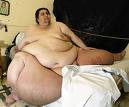
New York: Manuel Uribe, a 42-year-old Mexican, who is officially the world’s heaviest man, has lost half of his body weight – 40 stone – on a high protein diet.
Ex- mechanic, Uribe, who weighed 89.8 stone after a 14-year junk food binge, has been bedridden for six years. As a result he suffered lesions and bed sores.
The dramatic loss in weight took place over two years and he is now determined to reach his target weight of 15.7 stone.
Originally he had planned to have gastric bypass surgery but instead went on the high protein Zone Diet with the help of US biochemist Dr Barry Sears.
Manuel, who lives in Moterrey, Mexico, with his fiancée Claudia Solis Miranda and his mother Orilia, started dieting after a tearful TV appeal two years ago where he begged viewers to save his life.
Although over-eating was a contributory factor in Manuel’s weight gain, doctors believe it is mainly down to hormone imbalance.
Shop until you drop…a dress size!

Cancel the gym membership, scrap the diet and forget about plastic surgery. Scientists have today announced what all women want to hear that shopping is good for your health.
Chevrolet, a carmaker synonymous with value for money, studied the neurological and physiological reactions of female shoppers as they hunted for bargains and compared these to other experiences to chart the effect of retail therapy on the body and mind.
On spotting a value for money item the average shopper experienced a surge in positive emotions, reflected by changes in the way their brain was working, together with an increase in heart rate and sweating, reflecting both their physical and mental excitement.
Neuropsychologist Dr David Lewis at Mind Laboratories who studied the shoppers explained: When were excited, neurons in the brain go into overdrive and powerful chemicals related to amphetamines are released into the blood that produce the feeling of a giddy high. The buzz people receive from value for money purchases also creates a physiological reaction that is very similar to that experienced with physical exercise: heart rates increase and blood pressures raise, which all lead to the body functioning more efficiently and healthily.
Over nine in ten women (93 per cent)** said they got more of a thrill from a thrifty shop, preferring bagging a bargain to kissing their partner (91 per cent), getting a promotion (85 per cent) or eating chocolate (73 per cent).
Additionally, over half of women (57 per cent) said they actually felt physically healthier after a successful shop and a further 44 per cent thought that an hour on the high street burnt off just as many calories as an hour in the gym.
Les Turton of Chevrolet comments: People have always said retail therapy is a natural anti-depressant, but now its actually official. Not only does spotting a value for money purchase leave you with a smile on your face, but it physically improves your health too, which means the more you shop the more weight you could potentially drop.
Background
* Neuropsychological research was conducted on 8 participants over a period of one day in February 2008.
Whilst shopping, participants were linked to concealed EEG monitors (Electroencephalography), fitted with scalp sensors in a neurocap. EDR (Electrodermal Response) monitors also measured the electrical resistance of the skin through finger sensors fitted to the non-dominant hand, and heart rate monitors were worn continuously. Participants also wore glasses kitted with a video camera so that responses could be correlated to experiences during their shopping trip.
** Chevrolet used the independent online research company MyVoice who surveyed 1,000 women, from across the country aged 18 and over, on 31st February 2008.
Moderate daily exercise reduces death in men
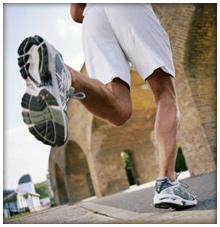
Washington: Brisk walking for just 30 minutes daily is enough to half the risk of premature death of men from all causes, according to new research.
The US-government-sponsored analysis — the largest such study ever — found that a regimen of brisk walking 30 minutes a day at least four to six days a week was enough to halve the risk of premature death from all causes.
“As you increase your ability to exercise — increase your fitness — you are decreasing in a step-wise fashion the risk of death,” said study author Peter Kokkinos, director of the exercise testing and research lab in the cardiology department of the Veterans Affairs Medical Center in Washington, D.C.
That conclusion applies more or less equally to white and black men, regardless of their prior history of cardiovascular disease. According to Kokkinos, that may be because the veterans in the study all received the same level of care, regardless of income.
This evened the playing field, he said, giving him “great confidence” in the results, which will be published in the Feb. 5 issue ofCirculationand were released online Jan. 22.
In the study, Kokkinos and his team reviewed information gathered by the VA from 15,660 black and white male patients treated either in Palo Alto, Calif., or in Washington, D.C.
The men ranged in age from 47 to 71 and had been referred to a VA medical facility for a clinically prescribed treadmill exercise test sometime between 1983 and 2006. All participants were asked to run until fatigued, at which point the researchers recorded the total amount of energy expended and oxygen consumed.
By tracking fatalities through June 2007, Kokkinos and his colleagues found that for both black and white men it was their fitness level, rather than their age, blood pressure or body-mass index, that was most strongly linked to their future risk for death.
The study proved that it takes relatively little exercise to achieve health benefits.
Loose weight without diets
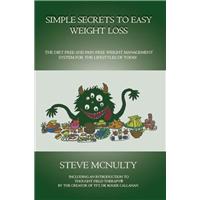
Simple Secrets to Easy Weight Loss is the new book by UK author and therapist Steve McNulty Steve makes a confident and sincere offer that if you do as he asks (and that what he asks costs nothing, is easy to do and doesn’t hurt) and if you do not lose weight, he will refund your money.
At 53, Steve decided that he needed to lose some serious weight if he was going to lead a long and healthy life. However, as he had a reputation for ‘eating for England’, he knew that he needed a plan that involved no diets or deprivation, no supplements or surgery, no pain and certainly no ongoing associated cost. He tried all the modern courses and plans and although he managed to lose some weight it quickly went back on.
Fed up of yo-yo dieting, he then set out to put together the perfect plan. Being a therapist and having trained in the most modern ‘mind sciences’, he knew roughly where to go to find everything ‘out there’ about losing weight. Having identified all the necessary ingredients he tried them out, keeping the ones that worked to and binning the rest.
The main ingredient Steve uses is Thought Field Therapy which enables him to collapse or eliminate any anxiety or food cravings, so allowing him to relax and eat heartily at the right time. Over the first eighteen months he lost two and a half stone (sixteen kilos) and has continued to lose another stone (six kilos) over the last year, making a total loss of three and a half stone.
“I haven’t been hungry once in the last 3 years”, says Steve “and my friends cannot believe how I still eat for England without increasing my weight”. Steve has identified that the real secret to managing our weight is to understand why we eat when we are not hungry. Once we understand this we can easily shift our eating patterns, eat plenty when we are hungry and manage our weight to a healthy level.
“There are three good reason to eat”, says Steve. Firstly, you must eat if you are hungry – that is the way we are built and we should never ever starve our bodies of food when we are hungry. Secondly, we should eat for our pure enjoyment. This means that eating a special meal, a really good dish or a rare treat is OK. Thirdly, eating to be sociable is OK as Steve says “I would never say no to a piece of the cake my Mum has just made especially for us when we pop round for afternoon tea.
However, he believes that all the other reasons for eating when we are not hungry are based in Anxiety. Reasons such as boredom, frustration, distraction, stress, anxiety, or habit should never force us to eat unnecessarily, and once the anxiety, or comfort element is eliminated the urge or compulsion to eat disappears. If you are not hungry and you have no compulsion you don’t need to eat. Eat when you are hungry and hey-presto the weight just drops off.
Steve uses his book as the text book for the weight management courses he regularly runs in Watford and London. The book includes everything which he has found to work for himself and his clients.
Steve believes that effective weight management requires a personalised plan and not a ‘one size fits all’ approach. Adopting the right plan will for each user become an unnoticeable part of everyday life. Steve’s courses last one day and the participants get all the tools they need to achieve their planned weight loss without ever having to return for more classes or having to spend more money. Steve says “2 weeks practice is all that is required to develop the right eating patterns and drop bad habits.”
Steve also offers one to one coaching and training in weight loss from his clinics in Harley Street, London and Watford. He also runs online support groups and forums to ensure everyone is supported while reaching their goals.
His book can be bought from his websitewww.stephenmcnulty.co.uk or on-line.
Boost your fitness regime with the new Salter Body Analyser

Christmas parties, Christmas lunch, Christmas pudding, Christmas cake, mince pies and mulled wine, edible and drinkable Christmas presents the list goes on and on and results in many of us bearing a closer resemblance to the traditionally rotund Old Saint Nick than we might like. And the result; come 12pm NYE we pledge that in the New Year we will be healthier, fitter or slimmer, but that is easier said than done.
Luckily Salter is at hand to aid on this journey with the convenient and innovative #9106 Glass Body Analyser Scale. Beneath the sleek exterior the scale features five smart analyser functions which measure weight, body fat %, body water %, muscle mass and bone mass. There is also an athlete mode and a ten user memory which will help all members of the household to understand what they are made of, as well as keeping track of weight or slimming goals whilst simultaneously giving a helpful health update.
As well as being easy to use, the Salter 9106 Body Analyser Scale is certainly easy on the eye; its contemporary stylish design and functional easy to read 40mm LCD display with illuminated icons makes the Salter 9106 Body Analyser Scale the perfect addition to any bathroom.
The Body Analyser Scale retails at around £50 and is available in the UK online and in store from Argos and John Lewis.
Salter is offering six 9106 Body Analyser Scales to ElixirNews readers. The six lucky readers will be selected in a draw. To take part in the draw please email us at readeroffer@elixirnews.com by January 15, stating Salter in the email headline, and giving us your name and address. Please note that no money eqivalent is being offered and the Editor’s decison is final.
Dr Nick Delgado – California
10% discount on Gold Rejuvenation Programme
Dr Nick Delgado PhD, CHT is a leading authority on anti-ageing and sexual medicine. He also specialises in hormone replacement therapy and nutraceuticals to aid rejuvenation.
To find out more:
How to walk your way to fitness in 2008
_&_Joanna_Hall_(R)_Small.jpg)
London: One of the most popular new year resolutions made each year is to get fit, but how many see it through? Not many, according to research* released in December 2007 which stated that 71% of people failed in their attempt,probably preferring the comfort of their sofa.
Joanna Hall, (pictured above right) one of the UKs leading fitness and walking experts and co-founder of Walkactive, has five top tips that get results. The good bit is that there isnt a gym in sight.
Joanna Hall says: Walking is simple, easy, and just about anyone can do it. Some people are sceptical about many of its benefits, but there is no disputing the research. Walking at the right pace and with the right technique can reduce the risk of many diseases and painful conditions (see Note 3 below). Whether someone is completely new to fitness, wants to firm up, lose excess Christmas pounds, or just get fitter and healthier, walking is perfect.
Walking has few side effects and can be done by almost anyone, anywhere.
Try Walkactives top five tips and start stepping into shape:
1. Invest in a good pedometer studies show that individuals who wear a pedometer are significantly more physically active than those who dont.
2. Establish your average daily baseline use your pedometer to record the number of steps you take per day for four days and work out your average steps per day (ideally you should include a weekend and work day to get a truer reflection of your weekly activity). During the first week you must match your baseline number of steps every day, then for the next 4 weeks, depending on how fit you are, add 500 or 1,000 steps to your baseline and match that new baseline each day. This approach gets you fitter gradually and helps you feel in control.
3. Establish your Optimum Walking Pace – this is the pace at which you feel slightly out of breath, feel you need to take off a layer of clothing and is most probably the pace you may walk at if you are late for a meeting but dont want to break into a run!
4. Fine Footwear – your footwear is the most important asset. Specialist shoes and boots are available for leisure, fitness, hill and mountain pursuits. Look for good support in your ankle and forefoot comfort and support do matter.
5. Spread your steps – split your days into zones and aim for a certain number of steps in each three or four time zones. This stops you having to achieve a huge step target all in one go at the end of the day, plus challenges you to use walking as a form of travel and reduces your carbon footprint.
Alissa Twisk, (pictured above left) leading charity walking expert and cofounder of Walkactive, says: Whether its walking to get fit, train for a charity walk, firm up, or lose weight, we have trained thousands of people to get the results they deserve. Our courses began in Central London locations but as of January 2008 we have grown to include venues spread around the South East. We also launched our online club in January so we can motivate and encourage in-between training sessions through weekly e-mail support, monthly online chats with Joanna and myself, and exclusive discounts on our courses and events. Anyone wishing to benefit from the power of walking can join our next courses which start from Sunday 20th January.
Further details of course dates, venues and how to book a place can be
found at www.walkactive.co.uk
*Professor Wiseman, University of Hertfordshire
1. WalkActive courses:
WalkFit is for those who want to get fit, firm and healthy and includes one one-hour session per week for six weeks with courses held on Sundays or weekday mornings.
Walk Firm makes lunchtimes count with a 45 minute cardio walking blast class. A dynamic class that will leaves you feeling toned, refreshed and full of energy for the afternoon. Held in Green Park on Thursdays.
Baby Buggy and Me helps mums regain their body through one 50 minute session a week for six weeks.
Walk Off Weight, is a 28 day course that gets weight and inches off through twice-weekly one-hour sessions and weekly 30 minute motivational talks.
2. WalkActive is run by two fitness and walking experts Joanna Hall and Alissa Twisk.
Joanna Hall is one of the UKs leading fitness experts and is passionate about walking. A regular on TV and radio, she is creator and presenter of four exercise DVDs and author of nine books, including three top ten best sellers. Joanna is committed to delivering programmes that work.
Alissa Twisk has for the past eight years trained and encouraged hundreds of people as they prepare to complete charity walking events. Her knowledge and hands on experience is widely sought.
3. The health benefits of walking.
Walking can help prevent heart disease, stroke, colon cancer, constipation, osteoporosis, impotence, high blood pressure and depression
Walking can help improve metabolism, breathing, circulation, concentration, memory, sleep, sense of well being, overall mood and stress levels
Walking can take inches off hips, thighs, bottoms and waistlines, manage weight, and strengthen muscles, bones and joints
The Clinic of Cybernetic Medicine Moscow
20 % discount on all treatments
Clinic of Cybernetic Medicine
T: +7 495 101 5030
Email: For information in English email Sono Wood suno@cybermed.ru
Web: www.cybermed.ru
“We treat the whole person – not just their illnesses” – Alexander Avshalumov, Founder and Director
This clinic specialises in the treatment – investigating the body as a whole – of many illnesses including:
Diabetes
Parkinson’s Disease
Neuroses and depression
Hepatitis including “C”
Breast disease and endometriosis
Erectile disfunction
Migraine, dizziness and headaches of uncertain origin
Psoriasis and eczema
Multiple sclerosis
Heart disease
Hypertension
Arthritis and stiff joint problems
Spinal disc problems – back pain
Acute and chronic lung disease
Kidney disease
Male and female genital disorders
Thyroid gland disorders
Abdominal and duodental ulcers
Disorders of the pancreas and intestines
Selected oncology
Chronic fatigue syndrome such as ME
Obesity
Complex symptoms of ill-health without clear diagnostics
In its approach to illness the clinic looks at the whole body and organ function in a series of comprehensive tests. These include “The Gold Standard” which includes 15 different types of diagnositics. Most of them are non-invasive: all are totally safe. The whole process takes only three to five hours – the result: a unique protrait of a person’s state of health, from the micro the macro, from the level of cellular metabolism and each individual body organ, to the working of the body as a coordinated, well-managed entity. The process is unique to this Moscow clinic.
The Gold Standard leads to an individually-designed programme of treatment which treats the body as a whole, restoring proper management and fuction.
The results to date are clear. A wide range of illnesses have ben successfully treated and chronic conditions and symptoms may be quickly and safely alleviated in our out-patients clinic in Moscow.
The Clinic of Cybernetic Medicine uses the latest US and Russian equipment including cardio vision equipment, cellular metabolism diagnostics, radio thermometry and magnetic tornado therapy amongst others.
Anti-obesity drugs fail to deliver long-term weightloss

London: Patients taking anti-obesity drugs will only see modest weight loss and many will remain significantly obese or overweight, according to a study published on www.bmj.com today.
In a new study from Canada, which looked at the long-term effectiveness of anti-obesity medications, it was found that three drugs recommended for long-term use – orlistat, sibutramine and rimonabant, reduced weight by less than 5kg (11 pounds). This equated to a loss of less than 5% of total body weight.
Whereas guidelines from the UK’s National Institute for Clinical Excellence recommend stopping the use of anti-obesity drugs if 5% of total body weight is not lost after three months.
While making changes to lifestyle and diet are recommended as the initial treatment for obesity, the use of anti-obesity drugs is common. Its estimated that in 2005 global sales of anti-obesity drugs reached $1.2billion. Current UK guidelines recommend using drug therapy in addition to making lifestyle changes if a patient has a body mass index of greater than 30.
The Canadian researchers reviewed the evidence from thirty placebo-controlled trials where adults took anti-obesity drugs for a year or longer. The mean weight of the volunteers in all of the trials was 100kg (15.7 stone). The mean body mass index levels were 35 36.
Professor Raj Padwal and colleagues found orlistat reduced weight by 2.9kg, sibutramine by 4.2kg and rimonabant by 4.7kg. They also found that patients taking the weight loss pills were significantly more likely to achieve 5 10% weight loss, compared to those who took the placebo.
The health benefits associated with taking the drugs varied. For example, orlistat reduced the incidence of diabetes in one trial and all three drugs lowered patients levels of certain types of cholesterol. Adverse effects were recorded with all three drugs, in particular, rimonabant increased the risk of mood disorders such as depression or anxiety. The authors noted that no trials examined rates of death and disease as a result of taking anti-obesity pills. They recommend that trials looking at this should be carried out in the future.
The authors also noted that there were high drop-out levels in all the trials. On average 30 40% of patients failed to complete the trial. They say this suggests that a failure to properly adhere to the treatment could be a major factor limiting the effectiveness of anti-obesity drug therapy.
In an accompanying editorial, Professor Gareth Williams warns of the potential damage to society if anti-obesity drugs are licensed to be sold without prescription. This already happens in the United States, and as Glaxo Smith Kline (GSK) has applied to sell orlistat over the counter throughout Europe, it could happen here.
He warns: Selling anti-obesity drugs over the counter will perpetuate the myth that obesity can be fixed simply by popping a pill and could further undermine the efforts to promote healthy living, which is the only long term escape from obesity.
Share your diet worries with weight management experts
London: Join weight management expert Dr Ian Campbell (pictured right) as he talks through issues relating to weight management and the phenomena of “yo-yoing” in a live web chat on Wednesday 20th June Chat time: 12:30 (GMT).
Can you relate to the one in ten women who have not applied for a job because they worry they are overweight or perhaps, like a quarter of women, you shut yourself in the home refusing to go out because you are so miserable about your weight? Most of us are aware of the health implications of being overweight, but size can also affect how we feel about ourselves as almost four out of five women feel there is a direct link between how much they weigh and whether they are happy or confident.
It’s not just women that this applies to though. According to research by Slimthru, one in ten men have let concerns about their weight prevent them from going on a date and nearly a quarter have been on a diet in preparation for a holiday. With more than half the country constantly dieting, it is comforting to know we are not alone but how can we lose those extra pounds, drop a dress size and keep the weight off for good? Eating less naturally leaves us with terrible hunger pangs but how can we stop ourselves from bingeing on crisps and chocolate and putting the weight back on?
Not only is it frustrating to regain all those pounds we lost but it is also hardly healthy to be constantly losing and gaining weight. With summer here, more than a quarter of people will go on a diet ahead of their holiday but what is the best way to lose those extra pounds and keep them off?
Dr Ian Campbell and Linda Duberley join us live online at < a href="http://www.webchats.tv/webchat.php?ID=394">www.webchats.tv on Wednesday 20th June at 12:30 to talk about loosing weight safely and keeping it off..
Ian Campbell A medical practitioner, Ian has become well known in the media for his direct and sensible approach to life. He is a full time GP and prominent campaigner for the prevention and treatment of obesity. Ian is a specialist at the Overweight Clinic, University Hospital, Nottingham, and founder and the first President of the National Obesity Forum. He is now the Honorary Medical Director of the leading charity “Weight Concern> ” , who won the Best New Charity of the Year Award in 2002 and works to address both the physical and psychological health needs of overweight people.
For more information visit: www.slimthru.co.uk”
>
Dieters cut calories rather than exercise
London: Dieters prefer to count calories rather than take the healthier exercise option, says a new poll from pharma giant, GlaxoSmithKline Nutritional Healthcare.
Twice as many dieters count calories to lose weight rather than exercise, a poll has found. And this diet loss method if more poplar with women than men.Calorie counting is most popular with women – half opt to count their food intake, compared with a third of men.
Surprisingly 59% of the 2,000 people surveyed by GlaxoSmithKline Nutritional Healthcare realised exercise makes the greater contribution to personal health.
More choice in low-calorie foods means people are giving up exercise in favour of consuming less, nutritionists say.
John Brewer, GSK Sports Scientist, said: “The trend of people swapping the gym for a low calorie meal is very worrying.
“Consuming fewer calories is no substitute for exercise. We cannot afford to become a nation of calorie-counting couch potatoes – the benefits of leading active lives are enormous.”
Graham Neale of GSK Nutritional Healthcare said diet food manufacturers had a responsibility to consumers.
He said: “With food and drink manufacturers broadening their ‘diet’ ranges, we need a concerted effort to encourage consumers to focus as much on ‘energy out’ as ‘energy in’.”
Xmas stress piles on the pounds
London: Christmas stress piles on the pounds, according to a new survey from Weight Watchers Online.
The survey reveals that:
· 57% name Christmas as the most sociable time of the year
· 82% name time off work as the most enjoyable part of the lead up to Christmas
· Over a third of people stress out thinking whether people will be happy with their Christmas present
· Over 1/3 of people find not tucking into all the left over food the hardest thing about the aftermath of Christmas
The stress of the festive period manifests itself in 12 Personas of Christmas the study concludes.
Shopping is undoubtedly one of the countrys favourite activities, this is voted the most stressful part of the festive season with 61% of participants claiming it is their number one headache.
82% of participants asked, said that they found Christmas, as a whole, the most stressful time of year.
With all the different stresses that surround the festive holidays, Weight Watchers Online has discovered the 12 Personas of Christmas.
Stressed Susan Suffers from Christmas shopping overload
Top Tip: make lists for all the shopping, who you need to buy for and buy a few extra backup presents just in case. Make use of the shops websites and catalogues for ideas.
Picky Pam – Loves to snack when near food at Christmas
Top Tip: replace those nibbles with healthier options. Place bowls of pretzels, rice crackers or Weight Watchers Rice Sticks around the house.
Frivolous Fred – Overspending on presents can cause stress and worry in the aftermath of Christmas
Top Tip: set yourself a budget to avoid overspending. Sit down and work out exactly how much you want to spend and how much you can afford. Dont forget to shop around for those presents; take advantage of gift offers that are in many shops.
Worrying Wendy A Worrying Wendy stresses about people being disappointed with their presents
Top Tip: Ask around for advice on what people might want, but stop giving yourself a hard time, its the thought that counts. How about making a personal gift with photos or homemade cookies? Try to remember this time of year is not just about presents.
Negative Nelly Stresses about losing weight to look good in time for Christmas Day.
Top Tip: Dont panic, were only human. If you have over indulged or are concerned about weight loss then seek tips and strategies from Weight Watchers Online, and you will soon be back on track.
Fashion Fretter Fran Ruins the run up by worrying what wear to the Christmas party
Top Tip: Remember you dont have to go over the top. Wear something youre comfortable and confident in and dress it up with wonderful accessories; perhaps some sparkly earrings or a glitzy handbag
Turkey Tim Stresses about cooking the Christmas dinner
Top Tip: Make a timetable and try and get as much done the night before. Delegate even if its just laying the table – youll be surprised how these little jobs can ease the stress from the cooking
Conscientious Carol – Spending times with the in-laws and relatives for many is a huge worry
Top Tip: Remember its only for one day, why not take yourself out for a walk for 10 minutes to try to relax, Try and plan in advance activities that will keep everyone entertained, such as the classic charades!
Money worry Mary Paying off the debts can worry many of us before, during and after Christmas
Top Tip: Christmas is not just about presents, you can be generous without being extravagant. Shop around for the best deals and dont forget to set out a payment plan by giving yourself a budget to stick to for the 6 weeks after Christmas. You can always give time as a present, offer to do the gardening, or a voucher for a home-cooked meal.
Torn Tracy A Torn Tracy worries about where to spend Christmas day; friends, family, partner?!
Top Tip: You dont have to upset anyone, divide up Christmas between the houses. Spend Boxing Day with one, Christmas Eve with another and have everyone to yours for drinks on the Bank Holiday
11. Hurrying Holly Always in a Hurry but never on time. Nothing seems to be done, everything is started, but left to the last minute.
Top Tip: Sit down, relax, and take a breath! Pick up a piece of paper and pen. Write a list of what you want to achieve and give yourself a time frame, do not be ambitious but be realistic.
And the persona we all strive for
12. Jolly Josephine – Whom everyone wants to be! Taking Christmas in your stride, looking forward to the big day and everything is under control and makes up the perfect timetable!
Top Tip: Share your knowledge and calmness with those around you!
Gina Schauffer, senior editor of WeightWatchers.co.uk says: “Christmas is undoubtedly a stressful time of the year, but its important to bear in mind that its only one day. WeightWatchers.co.uk offers a stress-free online weight loss service, available 24/7, with recipe ideas, fitness tips and interactive message boards where one can share Christmas tips and experiences with like-minded people. However, Christmas comes but once a year and everyone deserves to enjoy a treat every now and again.”
Other interesting statistics;
· 57% name Christmas as the most sociable time of the year
· 82% name time off work as the most enjoyable part of the lead up to Christmas
· Over a third of people stress out thinking whether people will be happy with their Christmas present
· Over 1/3 of people find not tucking into all the left over food the hardest thing about the aftermath of Christmas
Brides-les-Bains Spa launches executive weight loss programme
Brides-les-Bains, a picturesque thermal resort in the picturesque Savoie region of the French Alpes launches an excutive fitness package in January 2007.
Combining skiing, rejuvenation and weight management, the “cure” programe is for busy and stressed executives and high flyers who can’t afford to take their eye off the business ball for weeks at a time.
The special six-day package includes a personal coaching program of thermal pampering, physical activity and private consultation and a bespoke post-cure nutrition plan.
There are several packages on offer:
Care package: 582 euros(US$738, UK£391)
Care package + accommodations with full board in a 3-star hotel : 1127 euros(US$1,428, UK£758)
Care package + accommodations with full board in a 2-star hotel: 999 euros(US$1,266, UK£672)
Morning skiing option, Vallée de Méribel : 28 euros day. This ski pass is valid from 9 to 12:30. However skiers can lunch at Méribel
and return to Brides-les-Bains on the Olympe cable car until 3 PM.
Details
Information/reservation
Thermes de Brides-les-Bains
Spa de Brides-les-Bains
BP 14 73573 Brides-les-Bains
Tel.: +33 (0)4 79 55 23 44
Fax: +33 (0)4 79 55 29 73
E-mail: contact@thermes-brideslesbains.com
Internet: www.thermes-brideslesbains.com
Accommodation and tourist information
from the Brides-les-Bains Tourist Office
Tel: +33 (0)4 79 55 20 64
Chewing gum has health benefits, says new report
London:The worlds largest manufacturer of chewing gum, The Wrigley Company, today announced the launch of the first Expert Report outlining the four key benefits of chewing gum.
The report pulls together research on how chewing gum can improve dental health (specifically aiding plaque reduction), help with weight management, improve concentration and alertness and also relieve stress. This is the first time the research, conducted by academics and scientists across the globe over the last few years, has been pulled together in one comprehensive, user friendly guide.
The launch of the Expert Report follows the creation of the Wrigley Science Institute (WSI) earlier this year. The Institute has been set up to conduct further research into the health benefits of chewing gum and brings together experts in their fields from Europe, United States and Asia. Initial findings from the WSI are due out later this year.
Most people associate chewing gum with fresh breath and a cleaner feeling mouth but the benefits of chewing gum are a lot broader than that. Research conducted in the last few years has already shown direct correlations between chewing gum and reducing stress, improving focus, effective weight management and dental health, said Alexandra MacHutchon, a Wrigley spokesperson.
This report brings together the science behind these claims in a consumer friendly report that also provides information on other additional benefits such as reducing acid reflux, helping with the affects of air pressure while flying and aiding smoking cessation.
The Expert Report is the first in what will be a series of updates from The Wrigley Company on the health benefits of chewing gum.
As the WSI publishes new research on the different ways that chewing gum can benefit your health we will be updating and refreshing the Expert Report and continuing to educate consumers. We are continually finding new benefits both in terms of general health and in specific medical areas such as surgery recovery times. As more research is commissioned we are very excited about the prospect of finding new ways in which gum can help people maintain a healthy body and mind, said Alexandra.
About the Wrigley Company
The Wrigley Company is the worlds leading manufacturer of chewing and bubblegum and a major player in the confectionery industry worldwide.
Some of Wrigleys most famous brands include Wrigleys Extra®, Airwaves®, Orbit®, Juicy Fruit®, Wrigleys Spearmint®, Doublemint® and Hubba Bubba®. Wrigley is committed to diversifying close to home and recently launched its first non-gum products for over one hundred years Extra Thin Ice and Extra Mints.
Weight-loss in older women may be early warning of dementia
New York: Loss of appetite in older women may be an early-warning of dementia, according to research from the Mayo Clinic in the US.
They have found that ten years before dementia, sometimes a precursor to the more serious Alzheimer’s disease sets, women may experience weight loss. Sufferers of dementia are also likely to weigh a stone less than they did 30 years earlier.
The doctors concluded that the weightloss was a direct result of the disease’s impact on the brain. They looked at 560 men and women diagnosed with dementia and noted their weight over a 30-year period. These were compared with another group free of the disease. A clear trend of weightloss amongst women with dementia emerged.
The researchers concluded that weight-loss could advance understanding of the mechanisms involved in the condition.



